
newsletter for faculty and staff | remote spring 2020
Humour in the time of COVID
or, “Why is that Toilet Paper Meme So Funny When I Have Plenty of Toilet Paper, and Not So Funny When I Don’t?”
» Sheila Ager, Dean of Arts
About five weeks or so ago, just as the University was on the verge of closing down on-campus classes and shifting us to WFH mode, people began circulating the funny ha-ha jokes and images around toilet paper hoarding, scarcity, and preciousness. At first, I laughed, but at the same time thought, “Well, I’d better pick some up.”

I went off to the Zehr’s I usually shop at, and was struck with the sight of the paper products aisle. I seem to recall my breath accelerating slightly, first sign of incipient panic. “No problem,” I said to myself, “I’ll pick some up at the drugstore.” I guess you can figure what I found when I got to the drugstore. Not only no toilet paper, but no Kleenex, and as I entered the store, I passed a man coming out, furtively clutching what turned out to be the last package of paper towels.
More accelerated breath. But someone had mentioned to me that one can place an order for pickup at the grocery store, so I cunningly created a Zehr’s account and ordered toilet paper. Being a responsible citizen, I limited myself to ordering only two packs. I got an e-mail saying my order had been received, and that my pickup window was between 2:00 and 3:00 the following day. “That’s it – problem solved!” I said to myself, and didn’t bother scrolling down through the rest of the e-mail.
The next day, I arrived at the Zehr’s and bumptiously informed the young men at the pickup section that I had an order waiting for me. Indeed, there was a package of toilet paper sitting on one of the shelves right next to their desk. They went through all their paperwork, checked the computer, and said, “No, you don’t.” Now, normally I am a fairly non-aggressive person (really), but I came right back at them and said, “Yes, I do, I paid for it!” We went back and forth like this a few times, then I pulled out my phone and said, “Look, here’s the message that has my order number and everything!” They thereupon told me that if I had scrolled all the way down, I would have seen (in red print) that the order couldn’t be filled because toilet paper was out of stock and that my VISA payment had been cancelled. I might at this point have succumbed to the next stage of panic (I don’t quite recall), and said something vaguely desperate like, “But what am I supposed to do?”, and once again was told, “Sorry – we just don’t have any toilet paper.” I returned to attack mode, and said, “Yes, you do – you’ve got some right there!”, stabbing my forefinger at the single package sitting on the shelf. One of them then said, “Yeah, I don’t know where that came from – I guess I could let you have that.”
I snatched it from him before he could change his mind and headed back out into the main part of the store, clutching the precious package to me, since I wasn’t going to be fool enough to let it just sit unattended in my cart. Eventually I had to put it down, but I was careful to put it in a bag first and pile my other bags on top of it. The whole incident drew to a quiet close as the cashier at the checkout remarked, “Huh – do we have toilet paper again?” With my spirits somewhat restored, I was able to laugh and say, “It’s a long story, but no – you don’t.”
Now, speaking of a long story, I didn’t realize that this trifling incident would consume so much of this piece. But I wanted to tell it because it epitomizes for me some of the things around emotion, stress, and humour, and why laughter is so important in difficult situations. I don’t pretend to be an expert in the psychological and sociological functionality of humour; these are just some observations I’ve made on the role of humour in my own life. They speak to why I usually like to bring some laughter into the updates that I’ve been sending since things got so serious – I think everyone has understood, but I just want to send some reassurance that it has nothing to do with taking things lightly.
Laughter’s a very powerful thing, which is why tyrants and totalitarian regimes can’t abide it. An ancient king of Egypt, Ptolemy II, allegedly had a courtier who’d made a crude joke about the king and his wife sealed into a lead jar and dropped into the sea to suffocate or drown, whichever happened first. As for modern tyrants who can’t take a joke – well, I’m sure you can come up with your own examples. “Only laughter can blow a colossal humbug to rags and atoms at a blast,” said Mark Twain; “against the assault of laughter, nothing can stand.” Of course, COVID itself doesn’t care if we laugh at it; neither is the COVID virus “cruel and callous”, as it was labelled on CBC one day last week (it is ugly, though – I’m getting so sick of seeing images of that hairy little golf ball). It’s impervious to our emotional response, and it’s not motivated by greed or rage or ego or hatred. But our own human responses to the COVID situation are deeply emotional, and if we’re at least able to laugh at ourselves (not each other), then we go a long way towards re-establishing a sense of control.
I’ve always believed that a sense of humour is really a sense of perspective.
Laughter re-establishes balance and reduces the monstrous to its proper proportions (which is frankly why I don’t like watching horror movies with my brother – I really like to be scared, but he persists in laughing at them). And when I’m undergoing an awkward, embarrassing, difficult, or painful experience, I generally try to have in the back of my mind, “Okay, I can make a good story out of this at some point down the line.” Like my Fire Chief story, which I’ll tell you all someday. Even if I can’t laugh at the situation at the time, I find that eventually reframing the experience as a “funny” story mitigates the negative emotions triggered by the original situation.

The image of myself with which I’m chiefly familiar these days, though I don’t always wear the fascinator.
Experts (yes, I read three articles before writing this piece) say that one of the wellsprings of humour is recognition. For me, one of the funniest moments in the book Bridget Jones’s Diary is a simple throwaway line where Bridget, watching her mother put on make-up, ruminates to herself, “necessity of open mouth during mascara application great unexplained mystery of nature.” I laughed out loud at this (for quite a while) simply because I immediately recognized it as true, even though I’d never thought about it: I always have my mouth open when I’m applying mascara, and so do other women I know. I think it’s the recognition aspect of humour that creates the social bonding and community that reassures us that others are like us, that we aren’t alone, and that it’s okay to be (merely) human.
So those toilet paper jokes are pretty funny.
But only when I have plenty of toilet paper in the house.
And finally, apropos of nothing in particular, but just a video I find hilarious: Eddie Izzard: the Death Star Canteen.
Virtual pivot: 975 undergrad courses migrated online
» Martin Cooke, Associate Dean, Undergraduate Students, (with Katherine Acheson, Associate Dean, Undergraduate Programs, and Julie Mulvey, Academic Officer)
It’s sometimes hard to believe it’s only been just over a month since this “crisis” started in earnest. I think that it is important that we appreciate everything that we’ve accomplished in this short and trying time.
Collectively, with only a week’s pause in classes, we moved an entire university online. In Arts, that affected 28 majors/programs and nearly 7,000 undergraduate students. In total, 975 Winter 2020 classroom courses ended up being delivered online from spare bedrooms and dining room tables. The Spring term is set to be exclusively online and, after a lot of hard work by everyone, we’re going to provide students with the best learning opportunities possible under these conditions.
Of course, this hasn’t been easy. Many instructors have had experience with online teaching, but for some this is a new adventure. I am amazed by the flexibility and creativity with which instructors have made this transition. We’ve picked up new tools beyond LEARN (Slack, WebEx, Zoom, Bongo), to reduce the distance between instructors and students, and between students and their classmates. Instructors have redesigned evaluations, recorded lectures, uploaded videos, and found ways to have students do group assignments and present or perform remotely.
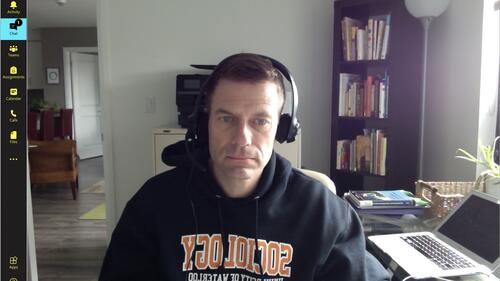
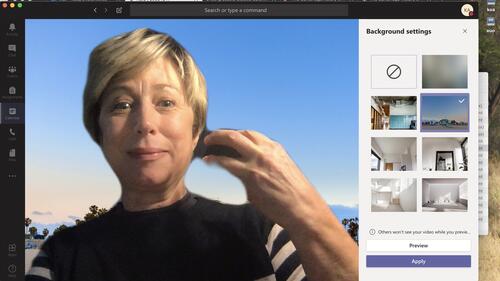
Martin Cooke (top) minus his usual suit and tie, and Kathy Acheson rocking a virtual background.
Graduate studies: facing the challenges as a community
» Liz Nilsen, Associate Dean, Graduate Studies
It has been quite the month (and counting). We have all had to adjust to a new environment — very quickly.
When changes were first underway, woven throughout the (email) discussions with graduate officers and coordinators was a fierce dedication to mitigate issues for graduate students. Of course, though, graduate training is not easily transitioned to an online environment. Because of this, many aspects have been impacted: important experiential learning activities have been postponed or cancelled, much research has come to an abrupt halt due to restrictions, access to key resources is limited, and opportunities for graduate students to showcase their work at conferences or exhibits have been cancelled.
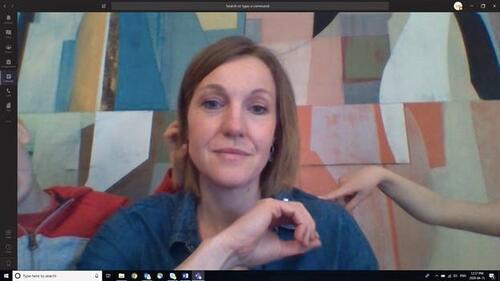
In a mid-March survey of 264 graduate students in Arts research-based programs, 75% indicated their research was interrupted, with 26% of these students indicating complete interruption. To add to this, many graduate students have suddenly found themselves having to meet academic deadlines while simultaneously taking on childcare. Students are understandably worried. Over the past few weeks, various supports have been put in place. We have transitioned defenses to be fully remote, increased flexibility for students with respect to academic milestones, re-sequenced activities to avoid cancellations, and ensured continued funding during the spring term. However, the personal support for our graduate students cannot be underestimated. I was struck by the number of students who, when given space to comment on the survey, noted the degree to which interactions with faculty and staff impact their stress levels. Students appreciate knowing that their instructors, supervisors, and committee members acknowledge the challenges they face. They appreciate the kind words and actions demonstrating support. They noted appreciation for supervisors making the time to connect, even though many supervisors too have new constraints on their time. They value faculty thinking beyond the current or next research project to consider their broader future within this context. And they value staff reaching out, not only to remind them about a form, but to see how they are doing. As a Faculty, I hope we can continue to have empathetic and honest conversations with our students – and that we can be creative and collaborative when working through the constraints. While we cannot change how long restrictions will be in place and activities will be on hold, we can ensure that our graduate students feel they are part of a supportive community in facing these challenges.

PhD students defending remotely
» Kaitlin O’Brien, Graduate Recruitment Officer
In the Faculty of Arts, the first remote defence was successfully completed on March 20. Yichun Huang, a graduate student in Economics defended her dissertation titled The Economics of Water Conservation Regulations in Mining: An Application to Alberta's Lower Athabasca River Region
“I understood the need to shift the entire defence online and I appreciated the university’s cautiousness and concern for everyone’s safety,” Huang says. “I already prepared myself fully for my defence before finding out that it needed to be held remotely, so I still felt confident in my ability to defend my research.”
Her defence was held on the WebEx platform, and it went off without a hitch. “Yichun’s presentation was very clear — which is a testament to the hard work she had put in to creating excellent slides for the presentation,” says Professor Margaret Insley, Huang’s supervisor.
Many faculty and staff within Arts helped to organize Huang’s remote defence. “Thanks to those in the GSPA and the Arts Computing Office who made this happen,” says Insley. “Also, thank you to Elizabeth Nilsen and Angela Christelis from the Arts Graduate Office and Pat Shaw and Phil Curry from Economics who played instrumental roles in the quick transition from in-person to the fully online defence.”
Once the defence concluded, in the absence of being able to shake hands and congratulate Huang on her wonderful accomplishment, all committee members agreed to drink a toast in their own homes in her honour. When the pandemic is over, the dissertation committee plan to gather in-person for a celebratory event. Congratulations Yichun Huang on your well-deserved success!
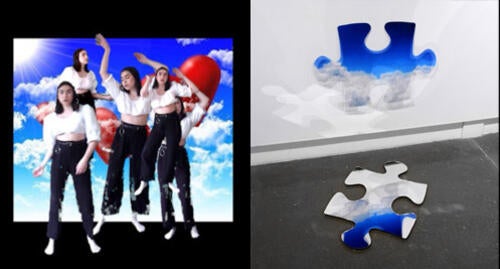
Virtual MFA thesis shows
» Tara Cooper, Associate Chair, Graduate Studies, Fine Arts
Timing is everything. On March 16 the President and Vice-Chancellor of the University of Waterloo issued an email that read “URGENT ACTION REQUIRED: work from home guidance.” And just like that the 2020 MFA cohort moved from working with a “business as usual” mentality to quickly vacating their studios, having no idea when they might return to a space that had become a second home. Concern mounted as COVID-19 spread and it became clear that UWAG (University of Waterloo Art Gallery) would also see its gallery doors close.
And then it became clear that the thesis exhibitions would be indefinitely postponed.
The pandemic has brought into sharp focus the fact that life is both beautiful and terrifying. Everything old is new again — except for the fact that the words and times that resonate now are ‘Spanish Flu, 1918-1920’ and ‘Black Death, 1331-1352’. Yet art finds its way through and becomes something that people look to and cling to. As true today as in the past. For artists our practice is a way to respond to the barometer of the time, providing us with an outlet or a reprieve, and even a reason to get up in the morning. For viewers the art offers a chance to make sense of it all.
We are proud of the 2020 class. Proud of their work and of their adaptability. Proud of their determination to see their degrees through in a time of crisis. It takes courage to carry on in a time of uncertainty and this courage will serve them well.
With extraordinary enthusiasm we raise our virtual glasses in celebration of Becca Wijshijer, Tyler Matheson, Brubey (Wanzhi) Hu and Kayla Witt. Bravo!
Strategic planning task force update
» Greg Campbell, Andrew Faulkner, Ranjini Jha – task force leads
At the end of the fall 2019 term, Sheila Ager, Dean of Arts, appointed a task force made up of faculty and staff representatives to lead the Faculty of Arts strategic planning process. This follows upon the recent release of the 2020-25 University of Waterloo Strategic Plan and will articulate our vision and goals within this larger University-wide framework. More information on the task force and our mission can be found on our Strategic Plan webpage.
In recognition of the fact that we are in uncertain months during which it is very difficult to reflect in detail upon the strategic direction of the Arts Faculty, we have temporarily paused the consultation process until mid-May 2020, when we will reassess how we will move forward with the process.
Though these times are difficult and full of fear and anxiety, the task force has come to see this situation also as an opportunity. The opportunity is to use our new reality to inform the strategic direction of our Faculty and not let the anxieties about the future negatively impact our community.
Our situation brings to mind Homer’s Iliad. At the beginning of Homer’s epic poem, the prophet Calchas, who knows ‘the things that are, that will be, and that have been’ explains the cause of the plague besetting the Greeks. Agamemnon, their leader, has offended the god Apollo, who is taking his revenge. In order to bring an end to the suffering, Calchas explains, Agamemnon must return his prisoner, the daughter of Apollo’s priest Chryses. The leader of the Greeks takes the necessary action, thereby ending the plague, but he does so with anger and reluctance, the result of which is an equally destructive fracturing of community and friendship.
In the current global COVID-19 crisis, Homer’s myth is, among other things, a reminder of the importance of community and friendship in the face of adversity. It’s been heart-warming over the past weeks to see how faculty members, staff, students, alumni and other stakeholders in the Arts Faculty have come together to support each other and those around us. And these challenges have shown just how strong and resilient our community is! The figure of Calchas in Homer’s myth also exemplifies the wisdom of facing present difficulties with an eye on both the past and the future. We don’t have Calchas’ prophetic talents, but we do continue in Arts to look towards the future with positivity. We look forward to talking with you soon. You are always welcome to contact any member of the task force with ideas and suggestions!
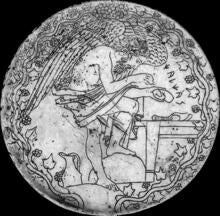
Task force members
Arts Staff Advisory Council update
» Tawnessa Carter, administrative manager and graduate coordinator, Philosophy
2020 has brought many changes to the Arts Staff Advisory Council (ASAC). In January we welcomed six new members: Sherri Anne Arsenault (Economics), Cynthia Bratan (Sociology & Legal Studies), Stephanie Cooper (SAF), Jennifer Doucet (Anthropology), Jen McCaig (Arts Advancement), and Kaitlin O’Brien (Dean’s Office) And we voted in a new chair and vice chair. I have taken over chair duties as our previous chair, Jessica Jordao, moved on to a secondment in the Registrar’s Office. Our thanks to Jessica for her leadership and ever-present smile. Janine Ouimet, research associate in the Psychology’s ITC Project, is the new vice chair. We are excited to work with our increased membership to build on ASAC’s range of activities and initiatives.
ASAC held its annual holiday cookie exchange in December where staff had the opportunity to sample homemade goods and show off their baking skills! In February we held another successful Arts coffee break with lots of new faces. This term, we also held a professional development workshop with Betty Pries on Transforming Polarized Thinking.
Our plans to hold a de-stress event at the end of April and a potluck and professional development workshop for May have been cancelled, of course, but we hope to resume planning for the fall term (fingers crossed). ASAC will continue to support the Arts staff community during this pandemic period by developing ideas and plan for future events.
Please check out the ASAC webpage for more information about who we are and what we do. We will be sending out a survey in the near future to ask for your feedback on ways we can provide more learning opportunities and events to engage and connect our community. We welcome your comments and suggestions at any time. Contact us at asac@uwaterloo.ca.
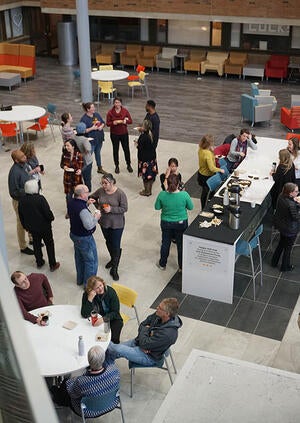
Arts communication team: How we can help you. How you can help us.
You might have noticed that COVID-19 has been dominating the news — and the University of Waterloo’s communications are no exception! While we can expect the pandemic to be in the spotlight for quite some time, University communication teams, including us here in Arts, are returning to other news and stories as well.
Over the next few months, we want to share stories about research and teaching that are related to the current exceptional times and that continue to highlight the great work happening within Arts at any time, pandemic or not. We’d also like to take this opportunity to remind you of how our communication team supports you, and vice versa.
What we do
- Write and source stories on research, teaching, students, alumni, and other Arts-related initiatives for various Arts and University channels
- Collaborate with Media Relations on media releases and expert advisories to help get Arts research in the media locally, nationally and globally
- Work closely with communication and marketing staff in University Relations to develop Arts stories for publications such as the Global Impact Report and Waterloo Magazine
- Develop and promote speaker events in collaboration with Faculty and campus partners
Arts communication channels
- Websites (Faculty and departmental websites, plus we “feed” other web channels such as Waterloo Stories)
- Arts and Letters alumni newsletter
- Inside Arts newsletter for faculty and staff
- Facebook, Twitter and LinkedIn (note: Instagram is managed by AUO)
- Digital screens in PAS and HH/History (e.g. promote events and new courses)
How we can help you
- Don’t get stumped by your unit’s website. We can help trouble shoot any issues in the WCMS, advise on web best practices and accessibility requirements, add site editors, connect you with training, and support your website analytics.
- Not sure what to post on departmental social media, how to manage content, or if you even need a social media account? We’re happy to chat and share tips and resources.
- Have an event to promote beyond your own unit? We can help.
- And of course, we can help departments tell their own stories and source photos - and then amplify these stories on social media.
How you can help us
- Let us know what you’re up to. Have a research paper coming out or project to share? Doing something new and innovative in your teaching? Know a student or alum who is doing something amazing? We’d like to know about anything that demonstrates Arts excellence – even if we don’t act on the shared information immediately, we’ll keep our eyes open for opportunities.
- Please tag @UWaterlooArts in your unit or personal-research social media posts that would be of wide interest so that we can amplify good news, media mentions, photos, etc.
- Please resist calling-out @UWaterlooArts or @UWaterloo if you have an issue to report, but feel free to send a private/direct message instead to the Faculty or University social accounts. We will do our best to redirect the issue to the right area.

Wendy Philpott
Communication Manager
Research, student experience, advancement, and internal communication; liaison with University communication and media teams; content creator for all channels. (Dog mom to the fluffball in the "S" in Arts.)
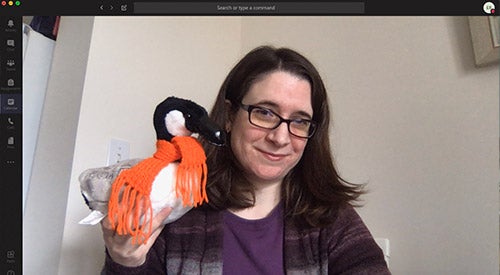
Elizabeth Rogers
Communication Officer
Digital communication management and strategy, including websites, social media, and liaison with IST web team; content creator for all channels. (Wishes she looked as good in orange as her goose does.)
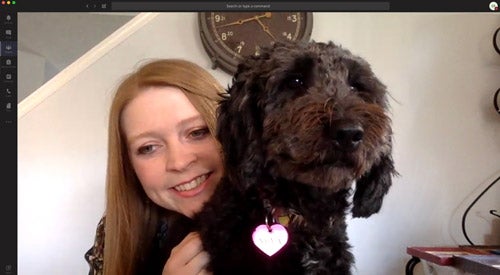
Kaitlin O’Brien
Graduate Recruitment Officer
Graduate studies marketing and communication; graduate research promotion; graduate student engagement. (Nova the Doodle takes great selfies.)
Feedback?
Inside Arts is published each term. Comments, ideas, and submissions are always welcome. Please contact Wendy Philpott.
